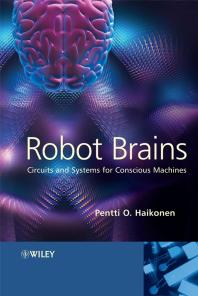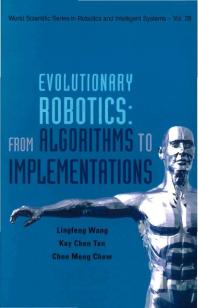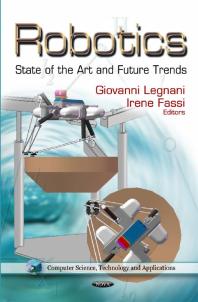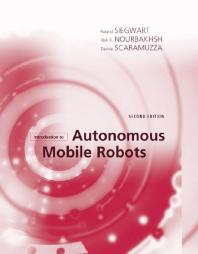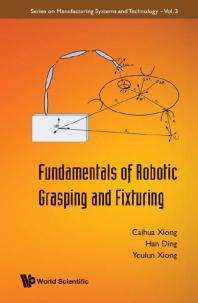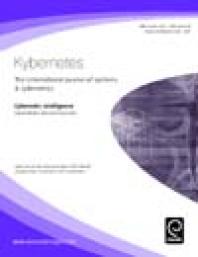Robotics and Cybernetics
The library's Robotics and Cybernetics collections include both electronic and print materials. Here, we provide you with a brief overview of useful resources from these ever-evolving, interdisciplinary fields. If you have additional suggestions for expanding the library's holdings in these areas, please let us know.
News
Frontiers in Robotics and AI
Frontiers in Robotics and AI is a novel academic journal composed of an expanding list of specialty sections, each of which has an independent editorial board of leading experts. Frontiers in Robotics and AI is set to be a comprehensive thematic open-access source of knowledge covering diverse areas across robotics research and technology and artificial intelligence.
Frontiers in Neurorobotics
Frontiers in Neurorobotics is devoted to leading edge research in the science and technology of embodied autonomous neural systems. Neural systems include brain-inspired algorithms (e.g., connectionist networks), computational models of biological neural networks (e.g., artificial spiking neural nets, large-scale simulations of neural microcircuits) and actual biological systems (e.g., in vivo and in vitro neural nets).
Robotics News & Articles - IEEE Spectrum
New books
Newly Arrived Print Journal Issues
The Periodicals Reading Room is on the 3rd floor to the right of the elevators in section 3D. There you can find the most recent issues of print journals.
Electronic Books
- ProQuest Ebook Central: Is an online library of eBooks, several thousand titles in the areas of robotics and cybernetics are included.
- INTECH: Open access robotics publications.
- Springer Tracks in Advanced Robotics (STAR): New developments and advances in the fields of robotics research, including multidisciplinary developments from the fields of Mechanical Engineering, Computer Science, Electrical Engineering, Mechatronics, Control, and Life Sciences.
Recommended eBooks
Print Books
Some of the books were moved – you can find them on the Floor 3, sector A, classroom 2.
| Subject | Shelf | Call number |
|---|---|---|
| Mechanics applied to machinery. Dynamics | 4C104-105 | TJ170-179 |
| Mechanical movements | 4C106-107 | TJ181-210 |
| Mechanical devices and figures. Automata. Ingenious mechanisms. Robots | 4C108-114 | TJ210.2-211.495 |
| Control engineering systems. Automatic machinery | 4C115-139 | TJ212-225 |
| Machine design and drawing | 4C140-141 | TJ227-240 |
| Machinery manufacturing | 4C142-146 | TJ241-254 |
| Cybernetics | 6C116-137 | Q300-327, Q350-390 |
| Cybernetics. Artificial intelligence | 6C125-135 | Q334-342 |
Online articles
Search across all collections using the search box at the top of every library page. Or search by database.
- SpringerLink: An extensive online database; the library provides access to articles from more than 1,700 journals.
- EBSCOhost: More than 8,500 full-text periodicals.
- ProQuest Central: General and applied science journals.
- ScienceDirect: Full-text from more than 2,000 journals in technology, mathematics, and computer science.
- Science Robotics: Groundbreaking advances in robotics across applications, systems, and scales of general interest to the robotics and research community.
eJournals
Search for journals the library subscribes to .
Recommended eJournals
- Advanced Robotics
- Robotics and Autonomous Systems
- Artificial Life and Robotics
- Intelligent Automation & Soft Computing
- Cybernetics and Systems
- Robotics and Computer-Integrated Manufacturing
- Artificial Intelligence
- Artificial Intelligence in Medicine
- Intelligent Service Robotics
- Autonomous Robots
- Applied Artificial Intelligence
Print Journals
| ISSN | Title |
|---|---|
| 1094-7167 | IEEE intelligent systems |
| 1070-9932 | IEEE robotics & automation magazine |
| 2168-2291 | IEEE transactions on human-machine systems |
| 1552-3098 | IEEE transactions on robotics |
| 1083-4427 | IEEE transactions on systems, man and cybernetics. Part A |
| 1083-4419 | IEEE transactions on systems, man, and cybernetics. Part B |
| 1867-2590 | Mechatronik |
| 1738-1991 | Smart structures and systems |
Reference resources
Springer Handbook of Robotics
The field of robotics has been rapidly expanding into the challenging terrain of unstructured environments. Unlike other handbooks that focus on industrial applications, the Springer Handbook of Robotics incorporates these new developments. Just like all Springer Handbooks, it is utterly comprehensive, edited by internationally renowned experts, and replete with contributions from leading researchers from around the world. The handbook is an ideal resource for robotics experts but also for people new to this expanding field.
Handbook of Industrial Robotics
120 leading experts from twelve countries have participated in creating this Second Edition of the Handbook of Industrial Robotics. Of its 66 chapters, 33 are new, covering important new topics in the theory, design, control, and applications of robotics. Other key features include a larger glossary of robotics terminology with over 800 terms. With contributions from the most prominent names in robotics worldwide, the Handbook remains the essential resource on all aspects of this complex subject.
Institutions
- CIIRC: The Czech Institute of Informatics, Robotics and Cybernetics at the Czech Technical University in Prague (CTU). CIIRC’s mission is to be an internationally recognized research institute contributing to student education and performing technology transfer.
- AI Center: The Artificial Intelligence Center is a new research center allied with CTU which follows the work of the Agent Technology Center. Its main goal is to provide basic and applied research in artificial intelligence (AI) and to transfer its technologies to industrial application.
- Strategic Artificial Intelligence Research Centre: The Strategic Artificial Intelligence Research Centre is a joint Oxford-Cambridge research center which aims to develop policies to be enacted by governments, industry leaders, and others in order to minimize risks and maximize benefit from artificial intelligence development in the longer term.
- CSAIL: The Computer Science and Artificial Intelligence Laboratory is the largest research laboratory at MIT and one of the world’s most important centers of information technology research.
- MIRI: The Machine Intelligence Research Institute is a research nonprofit studying the mathematical underpinnings of intelligent behavior. Its mission is to develop formal tools for the clean design and analysis of general-purpose artifical intelligence systems with the intent of making such systems safer and more reliable as they are developed.
- ISAL: The International Society for Artificial Life (ISAL) is a democratic, international, professional society dedicated to promoting scientific research and education relating to artificial life, including sponsoring conferences, publishing scientific journals, and maintaining web sites related to artificial life. Artificial Life (published by MIT Press) is ISAL's official journal, and the biannual International Conference on Artificial Life (ALIFE) and European Conference on Artificial Life (ECAL) are the society's official scientific gatherings.
Other web pages
- Robohub: Is a nonprofit online communication platform that brings together experts in robotics research, start-ups, business, and education from across the globe. Its mission is to connect the robotics community to the rest of the world. Content-area specialists curate all incoming articles to make sure that reporting is truthful, fair, and balanced, and in-house editors ensure that all content meets the highest editorial standards for language and clarity.
- MIT Technology Review: Provides an intelligent, lucid, and authoritative filter for information about technology.
- AITopics: AITopics is a mediated information portal provided by The Association for the Advancement of Artificial Intelligence with the goal of communicating the science and applications of AI to interested people around the world.
Robots
TED is a nonprofit devoted to spreading ideas, usually in the form of short, powerful talks. As machines grow ever more intelligent, they're emerging not just as powerful tools, but close companions. These TED Talks offer both whizzy demos and serious ideas on our evolving relationship with robots.
DeepMind
DeepMind is a machine learning system that uses algorithms based on deep neural networks and reinforcement learning to train on massive datasets to be able to predict outcomes. In March 2016, DeepMind's AlphaGo program beat world champion in 4 out of 5 games of Go, a huge victory in AI that came much earlier than many experts believed possible.
Your contact

Edita Jindráková
- edita.jindrakova
- 232 002 518
- 778 453 025
Subjects
Photography and Film, Robotics a kyberneticsSee also
Original Author: P. Tassanyi



